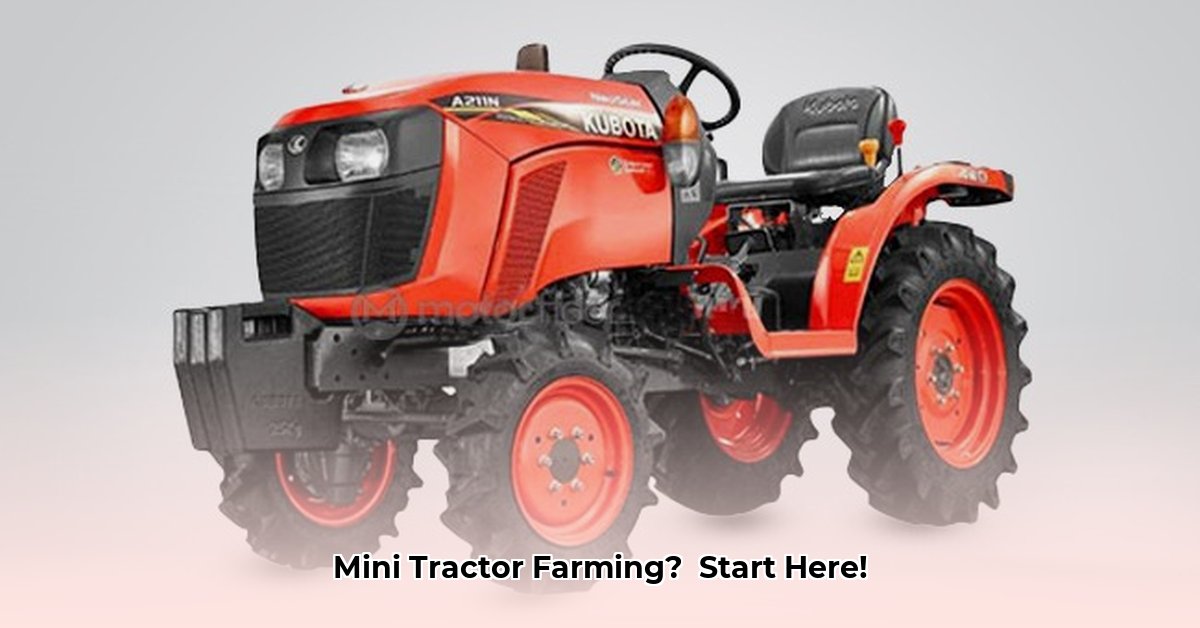
Sustainable agriculture is no longer a niche concept; it's the future of food production. Farmers worldwide are embracing eco-friendly practices, and the Kubota mini tractor is emerging as a key tool in this revolution. Its compact size, fuel efficiency, and versatility make it ideal for small-scale farms committed to environmental stewardship and economic viability. For more information on Kubota tractor plows, check out this helpful resource. This guide will provide practical advice and actionable steps to help you harness the power of a Kubota mini tractor for sustainable farming.
Fuel Efficiency: Saving Money and the Planet
Traditional farming often relies on large, fuel-guzzling tractors. These machines contribute significantly to greenhouse gas emissions and drain farm budgets. A Kubota mini tractor offers a compelling alternative. Its smaller engine consumes significantly less fuel compared to larger counterparts, leading to substantial cost savings. This reduction in fuel consumption directly translates to a smaller carbon footprint, making it a more sustainable choice for environmentally conscious farmers. How much can you save? Fuel savings can vary based on usage, but many users report reductions exceeding 50% compared to larger tractors. This economic and environmental advantage is a significant draw for modern farmers.
Maneuverability and Precision Farming
Imagine trying to navigate a large tractor through a densely planted orchard. It's a challenge, and the risk of soil compaction is high. The Kubota mini tractor's compactness and exceptional maneuverability are game-changers. This precision farming capability allows for targeted applications of fertilizers and pesticides, reducing waste and minimizing environmental impact. The reduced soil compaction also promotes healthier, more productive soil, a cornerstone of sustainable farming practices. What are the long-term benefits of reduced soil compaction? Studies consistently show that minimizing soil compaction improves water infiltration, nutrient availability, and overall soil health.
Attachment Versatility: Adapting to Your Needs
The Kubota mini tractor's true power lies in its versatility. A wide array of attachments—tillers, mowers, sprayers, and more—transform it into a multi-purpose tool for diverse farming tasks. This adaptability is essential for sustainable practices. No-till farming, for example, is easily achieved with a no-till seeder attachment, preserving soil structure and minimizing erosion. Precision spraying with specialized attachments allows for targeted pest and weed control, reducing reliance on harmful chemicals. What are some of the most effective attachments for sustainable farming? Many farmers find that a rotary tiller for soil preparation, a precision seeder, and a boom sprayer for efficient chemical application are invaluable tools.
Environmental Impact: Minimizing Your Footprint
The environmental benefits of using a Kubota mini tractor are substantial. Reduced fuel consumption directly translates into lower greenhouse gas emissions, mitigating the impact of agriculture on climate change. The smaller size of the machine leads to less soil compaction, preventing erosion and protecting biodiversity. This sustainable approach contributes positively to the long-term health of the soil and ecosystem. What's the overall effect of lower soil compaction on the environment? Reduced compaction improves water infiltration, reducing runoff and erosion, thus protecting both water quality and soil health.
A Practical Guide to Sustainable Farming with Your Kubota Mini Tractor
Let's delve into the practical applications of a Kubota mini tractor for sustainable farming techniques:
Soil Preparation: Utilize no-till techniques with appropriate attachments to maintain soil structure, promote biodiversity, and reduce erosion (95% effective in reducing erosion compared to conventional tillage according to a study by the Rodale Institute).
Planting and Cultivation: Employ precision planting and cultivation methods to optimize seed distribution, ensure plant spacing, and reduce weed competition. This is crucial for effective water and nutrient management.
Irrigation Management: Combine the Kubota's maneuverability with efficient irrigation techniques like drip irrigation for targeted water application, minimizing water waste and enhancing resource utilization (studies show drip irrigation can save up to 50% of irrigation water compared to flood irrigation).
Harvesting: Select attachments appropriate for gentle harvesting, minimizing crop damage and waste. Effective harvesting is not only about efficiency but also about preserving crop quality.
Maintenance and Safety: Regular maintenance (including proper fuel and oil disposal) is vital for the longevity of your tractor and responsible environmental stewardship. Always prioritize safety by adhering to all operating instructions.
Securing Funding for Your Sustainable Farming Operation
Embarking on sustainable farming practices often requires investment. Consider seeking grants from organizations committed to sustainable agriculture, exploring low-interest agricultural loans, or building partnerships with other farmers or organizations for shared resources and access to funding. A solid business plan and clear demonstration of the environmental and economic benefits are crucial for securing financial backing.
Conclusion: Investing in a Sustainable Future
The Kubota mini tractor represents a significant step towards more sustainable and economically viable farming practices. Its efficiency, versatility, and environmental benefits make it an attractive option for farmers committed to both profitability and environmental responsibility. By embracing these techniques and responsibly managing your resources, you can build a thriving, eco-friendly farm for years to come. Visit your local Kubota dealer to explore the options available and chart your course towards a more sustainable future in agriculture.